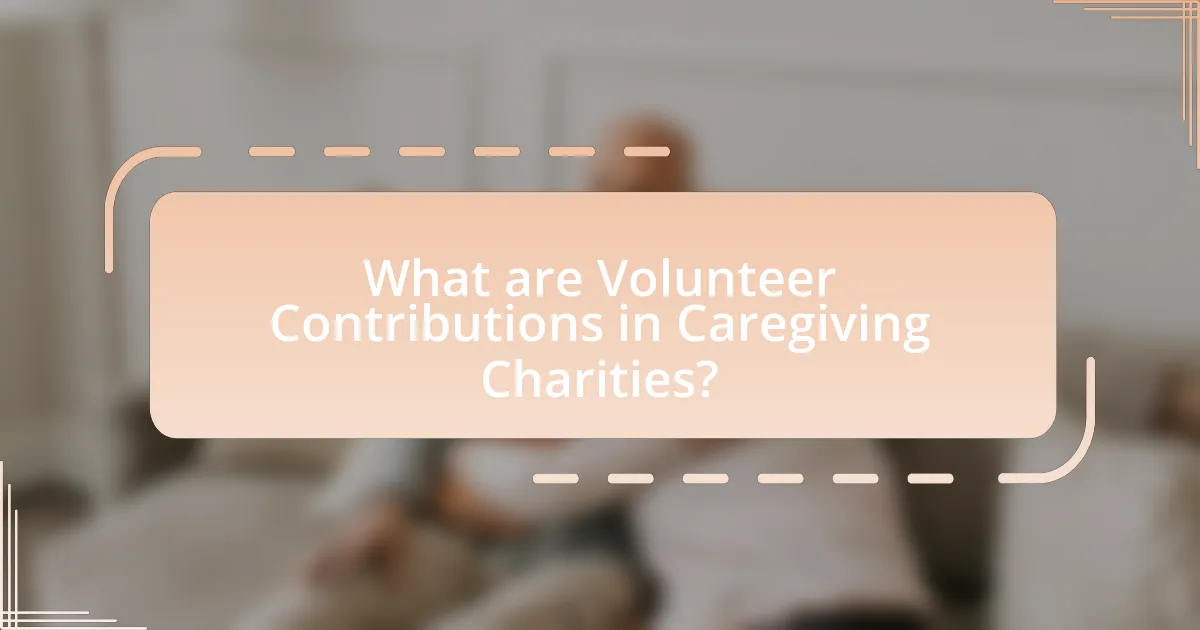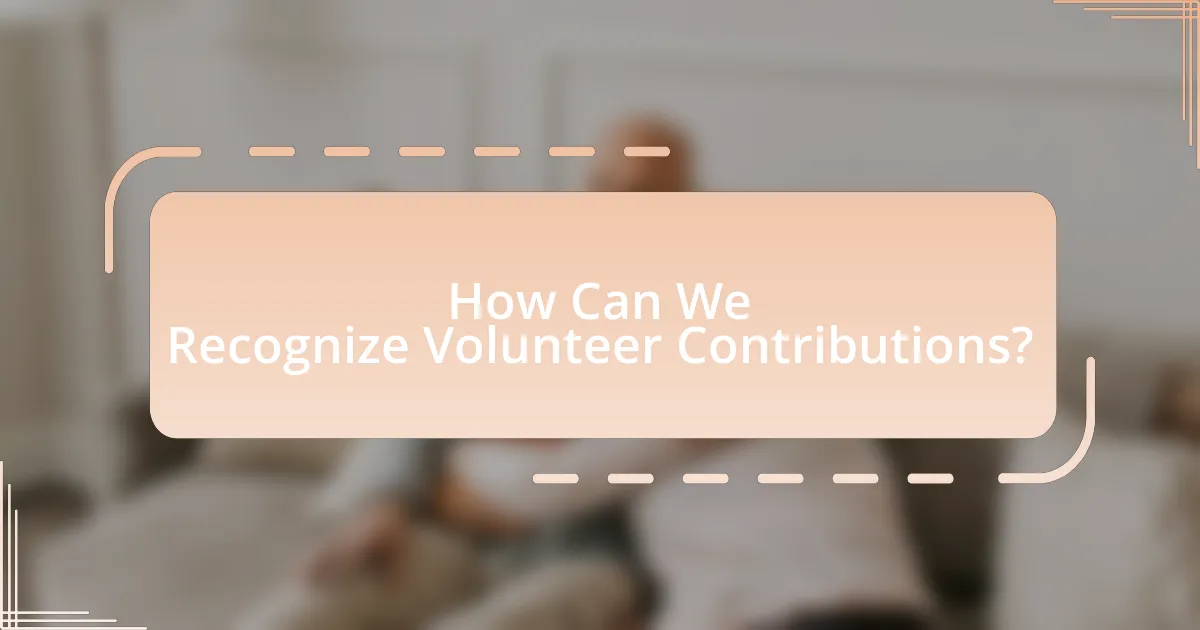The article focuses on recognizing and celebrating volunteer contributions in caregiving charities, emphasizing the vital role volunteers play in enhancing the quality of care for individuals in need. It outlines various types of volunteer contributions, including direct caregiving, administrative support, fundraising, and community outreach, and discusses how these efforts significantly impact the operational capacity and mission of caregiving organizations. Additionally, the article highlights best practices for recognizing volunteers, the psychological benefits of acknowledgment, and the challenges organizations face in implementing effective recognition programs. By fostering a culture of appreciation, caregiving charities can improve volunteer retention and engagement, ultimately benefiting the communities they serve.

What are Volunteer Contributions in Caregiving Charities?
Volunteer contributions in caregiving charities encompass the time, skills, and resources that individuals offer to support the care of those in need. These contributions can include direct caregiving services, administrative support, fundraising efforts, and community outreach initiatives. For instance, a study by the Corporation for National and Community Service found that volunteers in health-related charities provide an estimated $25.5 billion in services annually, highlighting the significant impact of their involvement. Such contributions not only enhance the operational capacity of caregiving charities but also foster community engagement and support for vulnerable populations.
Why are Volunteers Important in Caregiving Charities?
Volunteers are crucial in caregiving charities because they provide essential support and services that enhance the quality of care for individuals in need. Their involvement allows organizations to extend their reach and impact, often filling gaps in resources and staffing. For instance, a study by the Corporation for National and Community Service found that volunteers contribute an estimated $184 billion annually to the U.S. economy, highlighting their significant role in various sectors, including healthcare and caregiving. This contribution not only alleviates financial burdens on charities but also fosters community engagement and strengthens social networks, ultimately leading to improved outcomes for those receiving care.
What roles do volunteers typically fulfill in caregiving charities?
Volunteers in caregiving charities typically fulfill roles such as direct caregiving, administrative support, fundraising, and community outreach. Direct caregiving involves providing companionship, assistance with daily activities, and emotional support to individuals in need. Administrative support includes tasks like managing records, scheduling appointments, and coordinating events, which are essential for the smooth operation of the charity. Fundraising efforts are crucial for sustaining the charity’s programs, and volunteers often organize events or campaigns to generate financial support. Community outreach involves educating the public about the charity’s mission and services, helping to raise awareness and recruit additional volunteers. These roles are vital for enhancing the charity’s impact and ensuring that it meets the needs of the community effectively.
How do volunteer contributions impact the overall mission of caregiving charities?
Volunteer contributions significantly enhance the overall mission of caregiving charities by providing essential support and resources that enable these organizations to deliver services effectively. Volunteers often fill critical roles, such as direct caregiving, administrative tasks, and fundraising, which allows charities to allocate more funds directly to their programs. For instance, a study by the Corporation for National and Community Service found that volunteers contribute an estimated $184 billion annually to the U.S. economy, demonstrating their substantial impact on nonprofit operations. This influx of volunteer labor not only increases the capacity of caregiving charities to serve more individuals but also fosters community engagement and awareness, further amplifying the charities’ missions.
What Types of Volunteer Contributions Exist?
Volunteer contributions can be categorized into several types, including direct service, administrative support, fundraising, advocacy, and skill-based volunteering. Direct service involves hands-on activities such as providing care, mentoring, or tutoring, which directly benefit individuals or communities. Administrative support includes tasks like data entry, organizing events, or managing communications, which help organizations operate efficiently. Fundraising efforts encompass activities aimed at generating financial support, such as organizing events or campaigns. Advocacy involves raising awareness and promoting causes related to caregiving, influencing public policy or community attitudes. Skill-based volunteering leverages specific professional skills, such as legal advice or marketing expertise, to benefit organizations. Each type of contribution plays a vital role in enhancing the effectiveness of caregiving charities and supporting their missions.
What are the different forms of volunteer work in caregiving charities?
Different forms of volunteer work in caregiving charities include direct patient care, administrative support, fundraising, and community outreach. Direct patient care involves assisting with daily activities such as bathing, feeding, and companionship for individuals in need. Administrative support encompasses tasks like managing records, scheduling appointments, and coordinating events, which are essential for the smooth operation of the charity. Fundraising efforts are crucial for generating financial resources, and volunteers often organize events or campaigns to raise awareness and funds. Community outreach focuses on educating the public about caregiving services and resources, helping to connect those in need with available support. These various forms of volunteer work are vital for enhancing the effectiveness and reach of caregiving charities.
How do these contributions vary by organization size and focus?
Contributions in caregiving charities vary significantly by organization size and focus. Larger organizations typically have more structured volunteer programs, allowing for a greater number of volunteers and diverse roles, which can lead to higher overall contributions in terms of hours and resources. For instance, a study by the Corporation for National and Community Service found that larger nonprofits engage volunteers at a rate of 20% higher than smaller organizations, resulting in more substantial community impact. Conversely, smaller organizations often rely on a tight-knit group of dedicated volunteers, leading to deeper personal connections and potentially more impactful contributions on an individual level, though the total volume may be lower. Additionally, organizations focused on specific caregiving niches, such as mental health or elderly care, may attract volunteers with specialized skills, enhancing the quality of contributions compared to more general caregiving charities.

How Can We Recognize Volunteer Contributions?
Volunteer contributions can be recognized through various methods such as public acknowledgment, awards, and personalized thank-you notes. Public acknowledgment can occur during events or through social media, highlighting the volunteer’s efforts and impact. Awards, such as “Volunteer of the Year,” provide formal recognition and can motivate continued involvement. Personalized thank-you notes express gratitude and can strengthen the relationship between the organization and the volunteer. According to a study by the Corporation for National and Community Service, recognition significantly increases volunteer retention rates, demonstrating the effectiveness of these methods in valuing contributions.
What Methods are Effective for Recognizing Volunteers?
Effective methods for recognizing volunteers include personalized appreciation, public acknowledgment, and tangible rewards. Personalized appreciation, such as handwritten notes or verbal thanks, fosters a sense of value among volunteers, enhancing their commitment. Public acknowledgment, through social media shout-outs or recognition events, increases visibility and encourages others to volunteer. Tangible rewards, like certificates or small gifts, provide concrete recognition of a volunteer’s contributions. Research indicates that organizations that implement these recognition strategies report higher volunteer retention rates, demonstrating their effectiveness in fostering a supportive volunteer environment.
How can organizations implement recognition programs?
Organizations can implement recognition programs by establishing clear criteria for recognition, creating a structured process for nominations, and utilizing various methods of acknowledgment such as awards, public recognition, or personalized thank-you notes. Research indicates that organizations with formal recognition programs experience a 31% lower voluntary turnover rate, highlighting the effectiveness of such initiatives in retaining volunteers. By actively engaging volunteers in the recognition process and ensuring that the programs align with organizational values, charities can foster a culture of appreciation that enhances volunteer satisfaction and commitment.
What are some creative ways to celebrate volunteer achievements?
Creative ways to celebrate volunteer achievements include hosting appreciation events, providing personalized awards, and sharing success stories through social media. Appreciation events, such as a volunteer recognition dinner or a themed party, foster community and allow volunteers to connect with one another. Personalized awards, like certificates or trophies, acknowledge individual contributions and can be tailored to reflect specific achievements. Sharing success stories on social media platforms not only highlights the impact of volunteers but also inspires others to get involved, as evidenced by organizations that report increased volunteer engagement after showcasing their volunteers’ accomplishments online.
Why is Recognition Important for Volunteers?
Recognition is important for volunteers because it enhances their motivation and commitment to the cause. When volunteers receive acknowledgment for their contributions, it fosters a sense of belonging and value within the organization. Studies show that recognized volunteers are more likely to continue their involvement, with a 70% increase in retention rates reported in organizations that actively celebrate volunteer efforts. This acknowledgment not only boosts individual morale but also strengthens the overall community, leading to increased engagement and productivity in caregiving charities.
How does recognition affect volunteer retention and motivation?
Recognition significantly enhances volunteer retention and motivation by fostering a sense of value and belonging among volunteers. When volunteers receive acknowledgment for their contributions, it reinforces their commitment to the organization and encourages continued participation. Research indicates that organizations that implement recognition programs experience a 31% lower turnover rate among volunteers compared to those that do not. This correlation suggests that recognition not only boosts morale but also creates a positive feedback loop, where motivated volunteers are more likely to remain engaged and contribute further.
What psychological benefits do volunteers gain from recognition?
Volunteers gain several psychological benefits from recognition, including increased self-esteem, enhanced motivation, and a stronger sense of belonging. Recognition validates their efforts, leading to improved self-worth and confidence in their contributions. Studies indicate that when volunteers receive acknowledgment, their intrinsic motivation to continue volunteering increases, as they feel valued and appreciated. Furthermore, recognition fosters a sense of community and belonging, which is crucial for mental well-being, as it connects volunteers to a larger purpose and group. This connection can reduce feelings of isolation and enhance overall life satisfaction, reinforcing the positive impact of recognition on volunteers’ psychological health.

What are Best Practices for Celebrating Volunteer Contributions?
Best practices for celebrating volunteer contributions include personalized recognition, public acknowledgment, and providing meaningful rewards. Personalized recognition, such as handwritten notes or tailored thank-you messages, fosters a sense of appreciation and connection. Public acknowledgment can occur through social media shout-outs, newsletters, or events, which not only honors the volunteers but also inspires others to participate. Providing meaningful rewards, such as certificates, small gifts, or opportunities for further involvement, reinforces the value of their contributions. Research indicates that organizations that actively recognize volunteers see a 50% increase in retention rates, highlighting the effectiveness of these practices in maintaining volunteer engagement.
How can organizations create a culture of appreciation?
Organizations can create a culture of appreciation by implementing regular recognition programs that acknowledge and celebrate the contributions of volunteers. These programs can include formal awards, shout-outs in meetings, and personalized thank-you notes, which have been shown to enhance volunteer satisfaction and retention. Research indicates that organizations with strong recognition practices experience a 31% lower voluntary turnover rate, highlighting the effectiveness of appreciation in fostering loyalty and engagement among volunteers. By consistently recognizing efforts, organizations reinforce the value of contributions, creating an environment where appreciation is embedded in the organizational culture.
What strategies can be employed to ensure ongoing recognition?
To ensure ongoing recognition of volunteers in caregiving charities, organizations can implement regular acknowledgment programs, personalized appreciation efforts, and structured feedback systems. Regular acknowledgment programs, such as monthly awards or recognition events, create a culture of appreciation and motivate volunteers by publicly celebrating their contributions. Personalized appreciation efforts, including handwritten notes or tailored thank-you messages, enhance the emotional connection between the organization and its volunteers, making them feel valued. Structured feedback systems, such as surveys or one-on-one check-ins, allow volunteers to express their experiences and suggestions, fostering a sense of involvement and ensuring their contributions are recognized and addressed. These strategies collectively contribute to sustained volunteer engagement and satisfaction.
How can feedback from volunteers enhance recognition efforts?
Feedback from volunteers can enhance recognition efforts by providing insights into their experiences and preferences, which helps organizations tailor their recognition strategies effectively. When volunteers share their thoughts, organizations can identify what forms of recognition resonate most, such as public acknowledgment, personalized thank-you notes, or events celebrating their contributions. Research indicates that 70% of volunteers feel more valued when their feedback is considered, leading to increased engagement and retention. By integrating this feedback into recognition efforts, caregiving charities can foster a more supportive environment that acknowledges the unique contributions of each volunteer.
What Challenges Might Organizations Face in Recognizing Volunteers?
Organizations may face several challenges in recognizing volunteers, including resource limitations, inconsistent recognition practices, and varying volunteer expectations. Resource limitations can hinder the ability to implement comprehensive recognition programs, as many caregiving charities operate on tight budgets. Inconsistent recognition practices may lead to feelings of undervaluation among volunteers, as not all contributions are acknowledged equally. Additionally, varying volunteer expectations can complicate recognition efforts; some volunteers may seek public acknowledgment, while others prefer private appreciation, making it difficult for organizations to tailor their recognition strategies effectively. These challenges can ultimately impact volunteer retention and engagement within caregiving charities.
How can organizations overcome common barriers to recognition?
Organizations can overcome common barriers to recognition by implementing structured recognition programs that are inclusive and accessible to all volunteers. These programs should be designed to ensure that recognition is timely, specific, and aligned with the values of the organization, which fosters a culture of appreciation. Research indicates that organizations with formal recognition programs see a 31% lower voluntary turnover rate, demonstrating the effectiveness of such initiatives in enhancing volunteer engagement and satisfaction. By actively soliciting feedback from volunteers about their recognition preferences, organizations can tailor their approaches to meet diverse needs, thereby reducing barriers and increasing the impact of recognition efforts.
What are the potential pitfalls of recognition programs?
Recognition programs can lead to several potential pitfalls, including favoritism, lack of inclusivity, and diminished motivation among unrecognized volunteers. Favoritism occurs when certain individuals receive recognition more frequently, which can create resentment and disengagement among other volunteers. Lack of inclusivity may arise if the criteria for recognition are not transparent or if they favor specific contributions over others, leading to feelings of exclusion among volunteers who may also deserve acknowledgment. Additionally, when recognition is perceived as inconsistent or arbitrary, it can diminish overall motivation, as volunteers may feel their efforts are undervalued. These pitfalls highlight the importance of designing recognition programs that are fair, transparent, and inclusive to effectively celebrate all contributions within caregiving charities.
What Practical Tips Can Enhance Volunteer Recognition Efforts?
Practical tips that can enhance volunteer recognition efforts include personalized appreciation, regular feedback, and public acknowledgment. Personalized appreciation, such as handwritten notes or tailored gifts, fosters a deeper connection and shows volunteers that their unique contributions are valued. Regular feedback, including performance reviews or informal check-ins, helps volunteers understand their impact and encourages ongoing engagement. Public acknowledgment, through social media shout-outs or recognition events, not only celebrates individual efforts but also inspires others to volunteer. Research indicates that organizations that implement structured recognition programs see a 31% increase in volunteer retention rates, highlighting the effectiveness of these strategies.
How can organizations tailor recognition to individual volunteer preferences?
Organizations can tailor recognition to individual volunteer preferences by conducting surveys or interviews to understand each volunteer’s preferred recognition style, whether it be public acknowledgment, private appreciation, or tangible rewards. This approach allows organizations to align their recognition strategies with the specific desires of their volunteers, enhancing motivation and satisfaction. Research indicates that personalized recognition can lead to increased volunteer retention rates, as volunteers feel valued and understood in their contributions. For instance, a study by the Corporation for National and Community Service found that volunteers who receive personalized recognition are 55% more likely to continue their service.
What role does communication play in effective recognition strategies?
Communication is essential in effective recognition strategies as it ensures that volunteers feel valued and acknowledged for their contributions. Clear and consistent communication about recognition initiatives fosters a culture of appreciation, which can enhance volunteer motivation and retention. For instance, studies show that organizations that regularly communicate recognition efforts experience a 31% lower turnover rate among volunteers. This highlights that effective communication not only informs volunteers about recognition opportunities but also reinforces their sense of belonging and importance within the organization.